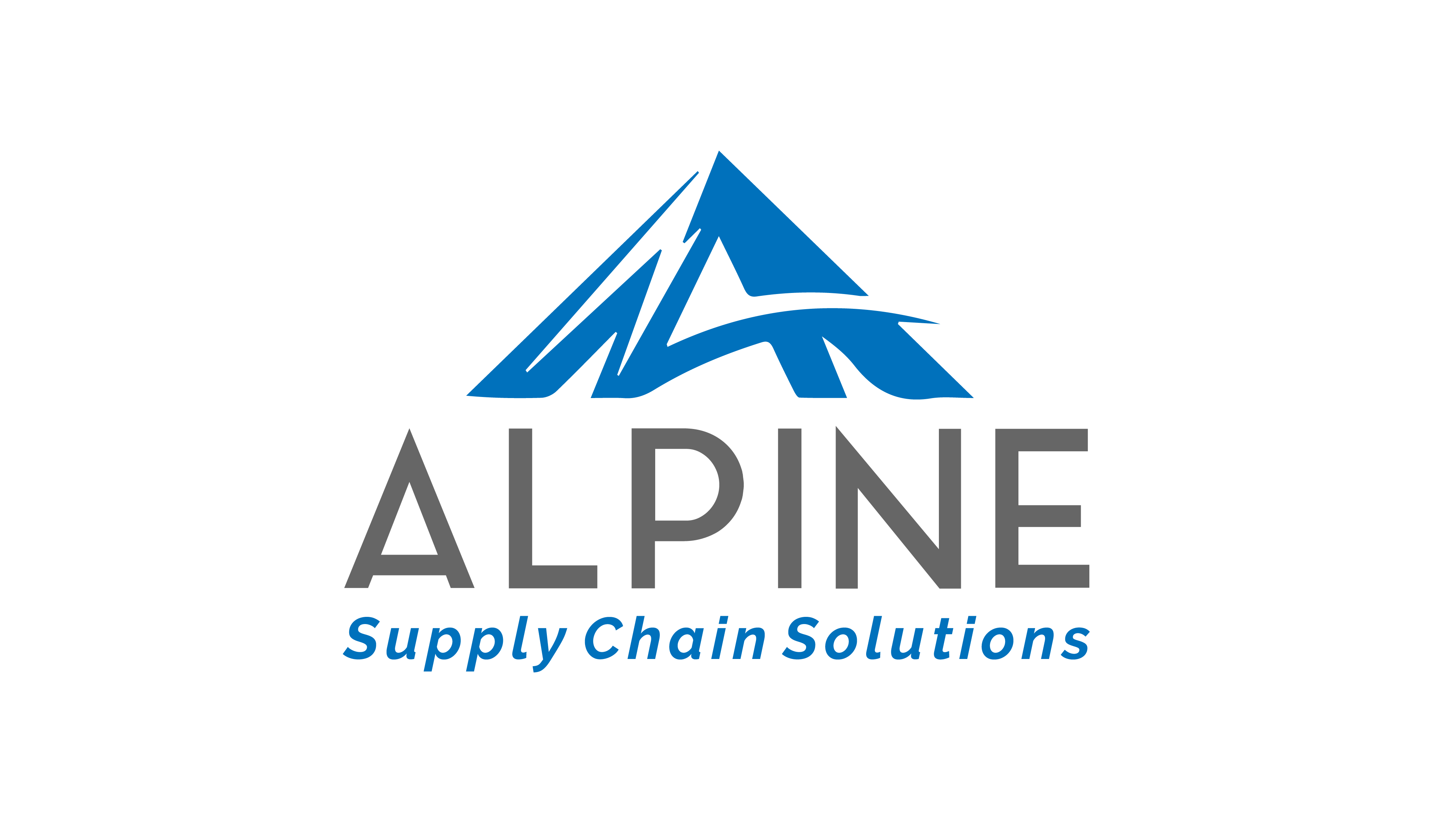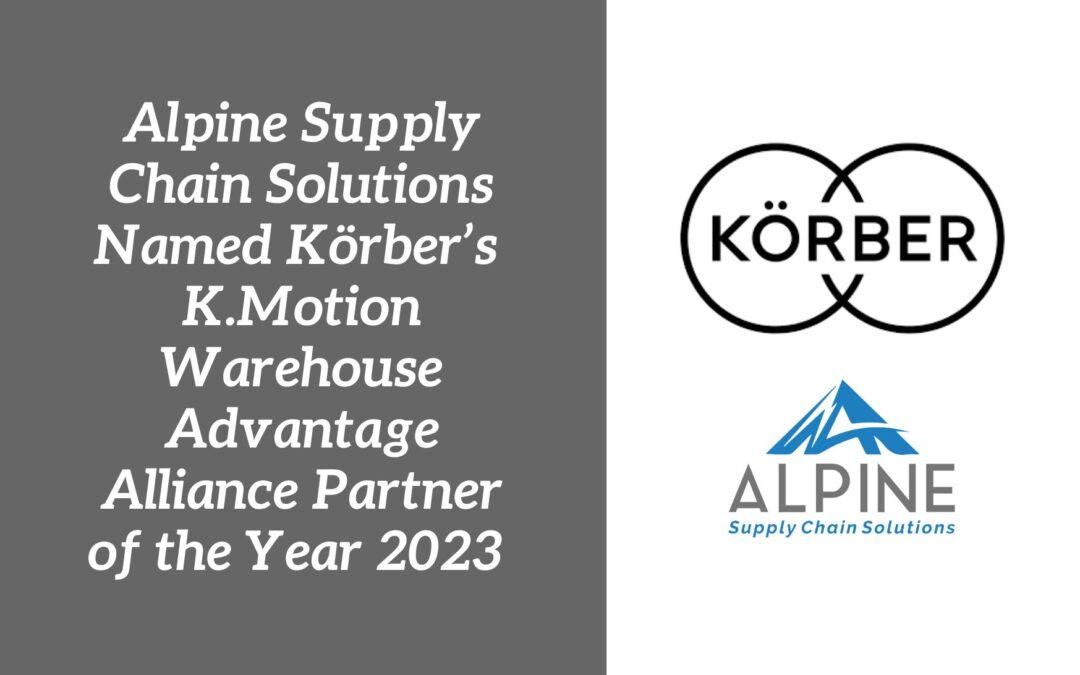
by Noelle Abarelli | Apr 22, 2024 | Alpine News Blog
NAPLES, FL — April 22, 2024 — Alpine Supply Chain Solutions, a boutique consulting company focused on maximizing supply chain investments, is proud to announce they have been named Körber Supply Chain Software’s K.Motion Warehouse Advantage Alliance Partner of the Year for 2023. This award recognizes Körber partners across key sales and customer success categories that align with some of the biggest challenges in the supply chain today. Alpine was selected as the winner of this category based on their engagement in leads, sales, marketing, and their two largest 2023 cosell deals in North America, True Value Company and QVC. The award was presented to Alpine’s Managing Principal, Michael Wohlwend, on the first evening of Körber’s Elevate Americas 2024 event taking place in San Diego, CA on April 21st-24th.
Through a distinctive data-driven methodology and extensive expertise spanning decades, Alpine spearheads operational enhancements within the warehouse, optimizing space, equipment, labor, and control. One of the company’s core focuses is supporting clients with WMS implementations. By synergizing Körber’s top-tier WMS solutions with Alpine’s profound implementation know-how, mutual clients benefit from a robust partnership guaranteeing WMS success.
“We are thrilled to celebrate the exceptional achievements of our 2023 Partner award winners, recognizing their unwavering dedication to sales and customer success,” said Carl DCosta, Global Partner Officer at Körber Supply Chain Software. “Our Partners are there delivering for our customers – understanding customer pain points, finding the right capabilities, offering the right Körber products and implementing them to deliver faster time-to-value”.
2023 marked the inaugural year for Körber’s K.Motion Warehouse Advantage Alliance Partner of the Year 2023. Alpine was recognized as Körber’s Breakthrough Partner of the Year at Elevate Americas 2023. To learn more, visit the conference website.
About Alpine
Alpine Supply Chain Solutions, based in Naples, FL, is a supply chain consulting company driven to ensure their clients get the most value from their investments. Their approach to every project starts with the data and ends with a cost justifiable solution. With deep roots in industrial engineering, Alpine’s approach is unique. For more information, please visit: AlpineSupplyChain.com
About the Körber Business Area Supply Chain
Supply chains are growing more complex by the day. Körber uniquely provides a broad range of proven, end-to-end supply chain solutions fitting any business size, strategy or appetite for growth. Our customers conquer the complexity of the supply chain thanks to our portfolio that includes software, automation, mail and parcel solutions, voice solutions, robotics, and materials handling – plus the expertise to tie it all together. Körber helps to manage the supply chain as a competitive advantage. Conquer supply chain complexity – with Körber. The Business Area Supply Chain is part of the global technology group Körber. To learn more about Körber’s Business Area Supply Chain, visit koerber-supplychain.com.
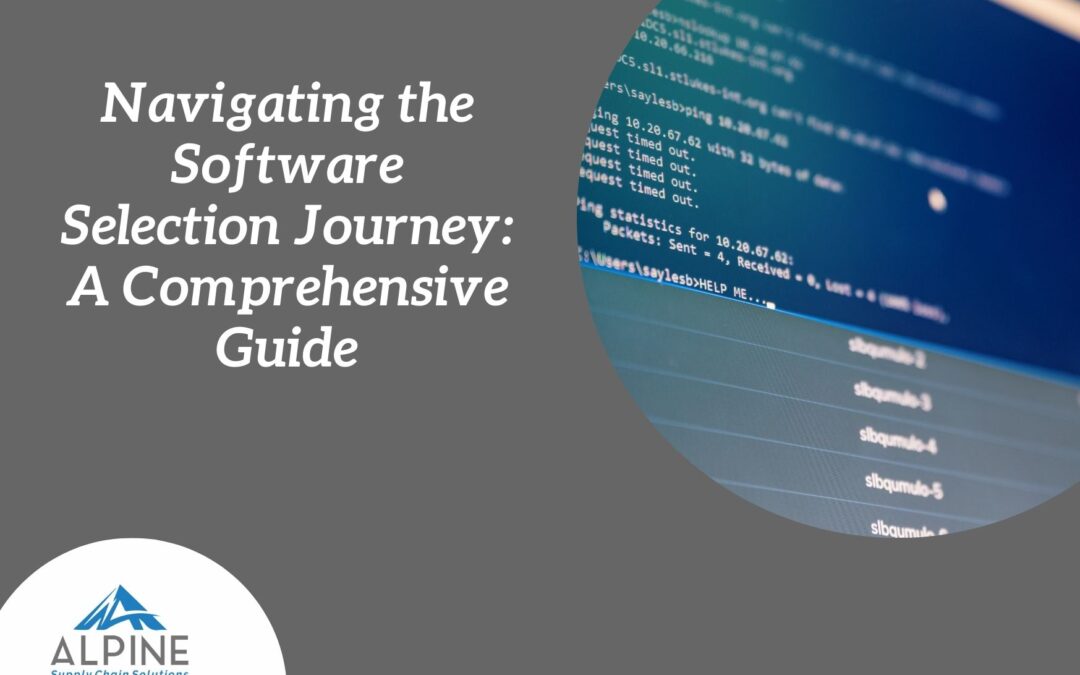
by Noelle Abarelli | Apr 17, 2024 | Blog
In today’s fast-paced business environment, selecting the right enterprise software can make or break an organization’s success. From streamlining operations to enhancing customer experience, the right solution can drive significant value. However, navigating the software selection journey isn’t simply about finding the most popular solution and implementing it. It requires careful planning, thorough evaluation, and strategic decision-making. In a recent webinar, The Journey: Buying Enterprise Software Effectively, Alpine experts explored all the facets involved in navigating the software selection process. Read the main takeaways below, or watch a recording of the webinar here.
Getting started
Selecting enterprise software effectively is a multi-faceted journey that involves several key steps. It begins with defining clear objectives and requirements, followed by the creation of a Request for Proposal (RFP) to solicit vendor responses. Leadership involvement is crucial at every stage to ensure alignment with organizational goals and objectives. In our experience, project success depends on eight critical factors.
#1 Leadership: Strong leadership is provided by executive management to oversee the project and provide support to the team.
#2 Achieving buy-in: The team should comprise subject matter experts and involve representation from all aspects of the business (e.g. warehouse team, IT group, sales, executive leadership, etc.) to ensure you don’t miscalculate resources, gain buy-in and ensure all requirements are met.
#3 Focus on the goal: The team needs to be focused on the project’s success with no distracting ulterior motives.
#4 Be methodical: Engage in a deliberate, engaged, and thorough process.
#5 Anticipate change: Be prepared to adapt and pivot as needed, large undertakings rarely go off without some surprises.
#6 Invest in due diligence: Fully vet any solution, technology, vendor/integrator references. This involves evaluating not only the software but also the vendor’s operations, culture, technology, and integration capabilities.
- You may be wondering if hosting a traditional demonstration is enough to vet vendors, and we’re here to tell you, it’s not. A traditional vendor demonstration is performed in a vacuum, you’re seeing how their solution works on the best of days when everything is within control and going as planned. It may not show you how the solution works with regard to the specific functionality you are looking for. In some cases, what you want to learn is not necessarily if a vendor performs a certain function, but how they do it so you can determine if it fits in with your processes.
#7 Contracting: Get details on all contracting needs and their structure regarding software and services. It’s critical to discover if the vendor provides everything you need, and what contract limitations may be.
#8 Execution: Ensure you have a strategy in place to handle change management, scope, budget control, and any ongoing needs.
Most importantly, it’s critical to determine what your organization considers a measure of success for the project. All team members must be aligned on this to work toward the same goal.
Why Implementations fail
Unfortunately, around 80% of implementations fail, and it’s not always because of the solution, but rather due to organizational complications. Sometimes it’s because there’s no organizational commitment or the organization sets unrealistic expectations to begin with. Other reasons include:
- The system implementation is viewed as an IT project rather than an organizational one
- The selected vendor is a bad match
- Inadequate education and training of the implementation team and its users
- Inflexibility in adapting to new processes (trying to do things the same way as before with the new software)
- Inaccurate data loaded into the system
And while there are many ways buying enterprise software can go wrong, there are tried and true strategies that can help you navigate the selection process with confidence.
Best Practices
As the software selection journey progresses, there are several best practices and insights to keep in mind.
-
- A structured approach to the selection process is critical, with a focus on thoroughness and avoiding shortcuts. This includes getting a clear understanding of what the business requirements are. This is where real attention to detail is critical, and no item is too small to include.
- The RFP phase requires significant effort to ensure clarity and enable vendors to respond effectively. The list of business requirements will be the foundation of this RFP, and will enable organizations to vet solutions down to every last detail.
- Don’t limit your search to the well-known names. This is a significant investment, so you want to get a complete picture of all that’s available to you. Including up-and-coming vendors in the selection process can help keep established vendors competitive.
- During demonstrations, prioritize scenarios that align with the organization’s most critical needs and push vendors to showcase their capabilities beyond standard demos. If possible, have a list of worst-case scenarios specific to your operation that you can throw into the demo to see how the vendor would respond.
- Technical deep dives with vendors are essential for understanding their product roadmaps, especially regarding cloud-based solutions and ongoing development efforts.
- Don’t rush the selection process. Hosting periodic workshops with the team allows for detailed discussions on cost estimates, project plans, assumptions, and resource requirements. It will also ensure nothing has changed in the plan and that everybody is still working with the same end goal in mind.
- Create a point system that will allow for subjective scoring of each solution presented. Assessing subjective feedback alongside objective scoring helps make well-informed decisions and identify potential gaps in understanding.
Remember, the ROI break-even time frame for a WMS implementation varies based on factors like the organization’s goals, the current system, and the expected productivity gains. Be sure to calculate what the target time frame for your project is. Consider leveraging industry-accepted tools that help estimate the ROI and break-even time frame more accurately.
Conclusion
As you embark on your software selection journey, remember to keep your organizational goals at the forefront and leverage the insights shared in this blog post to guide your decision-making process. With the right approach and careful consideration, you can navigate the complexities of the software selection journey and unlock the full potential of your organization.
Researching, vetting, and sourcing enterprise software is not everybody’s expertise, that’s where we come in. If you’re looking to invest in enterprise software, but aren’t sure where to begin, we can help. We are experts in ensuring operations get the most out of their supply chain investments. Reach out. We’ll set you up with optimal solutions that drive maximum value.

by Noelle Abarelli | Apr 2, 2024 | Alpine News Blog
In light of the escalating costs associated with education, ensuring access to learning opportunities is paramount. It’s with this commitment in mind that the Pat Gallagher Scholarship fund was established in 2020.
Conceived by Alpine Supply Chain Solutions in honor of Pat Gallagher, a founding member of the company, the scholarship recognizes two promising individuals annually with $2,500 each to support their educational endeavors, whether it be tuition, textbooks, or other scholastic necessities.
Pat, a seasoned veteran with 25 years of experience in supply chain engineering, played a pivotal role in designing, constructing, and managing distribution center networks for numerous Fortune 500 companies. The recipients of the Pat Gallagher Scholarship embody traits of hard work, determination, and a passion for the supply chain industry. According to Pat’s wife, Lori, “Pat would have been thrilled to know that he’s contributing to the education of young engineers. He was always eager to mentor others and had a deep love for his profession.”
This year marks a milestone as both scholarship recipients are women: Madeline Wine and Hana Turkmani, both juniors pursuing degrees in Supply Chain Management at Michigan State University.
Both Madeline and Hana are extremely engaged at MSU. Madeline is a member of Delta Sigma Pi, serves as the Marketing and Recruiting Coordinator for MSU Collegiate DECA, and is a mentor for the Honors Peer Navigators Mentorship Program. Hana is a member of the Tower Guard, Women in Business, and M-Rule Diversity and Inclusion. As busy as they are, each scholar manages to maintain perfect GPAs!
We are honored to support Madeline and Hana on their educational journeys and eagerly anticipate the remarkable accomplishments they will achieve as they advance in their careers in the supply chain industry.
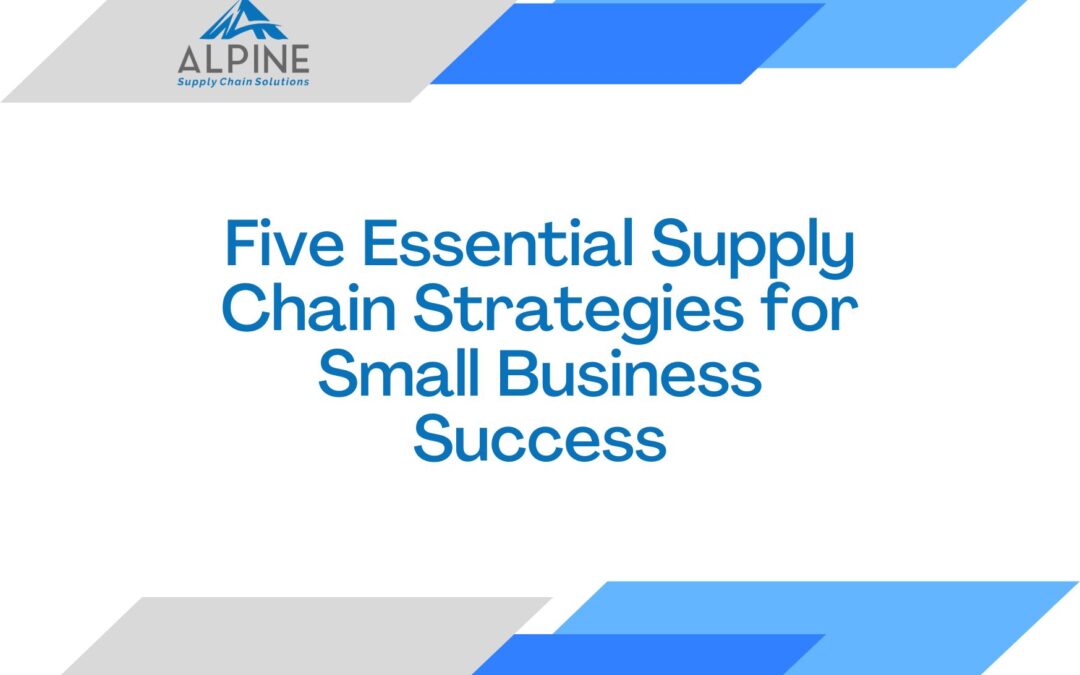
by Noelle Abarelli | Mar 27, 2024 | Uncategorized
Small and mid-sized businesses (SMBs) face the undeniable challenge of meeting consumer needs while addressing operating costs that can be unforgiving for companies of a smaller size. With those challenges, comes the need to invest in savvy supply chain solutions that won’t hold them back. While there are countless strategies they can employ, some rise to the top with the most promise.
Inbound Logistics recently spoke to Alpine’s Senior Director, Brandon Novak, about his insights into how SMBs can thrive in an ever-fluctuating market. In their article, Getting to Big: SMBs Embrace Tech Partnerships, they uncover different supply chain strategies SMBs can implement to stay ahead of the curve. The main takeaway: SMBs require investment in supply chain partnerships and technology to sustain and grow.
Five Steps to Success
Read on for five tips that Novak and other industry experts suggest SMBs implement to stay on top.
- Navigating supply chain operations and partnering with logistics and technology vendors are crucial for SMBs. It provides access to advanced technology, can present cost savings, is scalable and flexible, and allows them to focus on their core competencies while providing superior customer service.
- For SMBs working with high demand or the unexpected popularity of certain products, a short-term solution to implement is to lean on vendors for extra assistance. Pushing packaging and labeling needs upstream to other vendors gives SMBs time to search for and eventually implement a long-term solution they can depend on later.
- Working with a third-party logistics (3PL) provider can offer SMBs specialized offerings, like cold storage or transportation management. Delegating supply chain functions to a 3PL will free SMBs to focus on their core competencies while bridging supply chain cost gaps.
- Eliminate “technical debt” as soon as possible. SMBs that have been operating for decades may have a cobbled-together set of enterprise software solutions that are barely keeping the operation on track. The inefficiencies within this are countless, and are more than likely leading to “technical debt” — the potential expenses that arise from choosing expedient but constrained solutions over more comprehensive approaches during software development. The longer it takes for operations to address these directly, the more inefficient and hindered they become.
- Regular check-ins and assessments of supply chain operations are essential for SMBs’ continued growth and scalability. Running an operation is not a set-and-forget business, it requires periodic evaluations to ensure nothing is falling through the cracks.
For more details on these expert recommendations, read the full article Inbound Logistics article here.
In a dynamic market environment where SMBs contend with both consumer demands and operational constraints, investing in robust supply chain solutions is paramount. These decisions are big ones, and it’s often difficult to get the full picture. That’s where we come in. We have the knowledge you need to determine what your SMB needs to thrive. Reach out to speak with one of our supply chain experts today, and let’s see how you can make the most out of your supply chain.
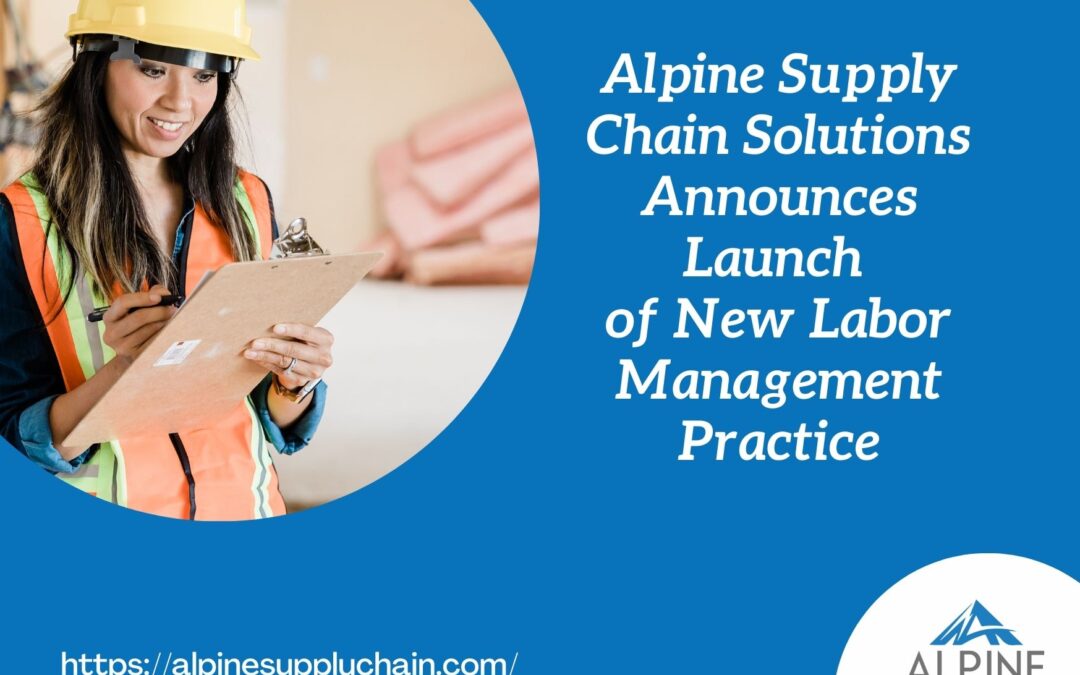
by Noelle Abarelli | Mar 11, 2024 | Alpine News Blog
Naples, FL—March 11, 2024—Alpine Supply Chain Solutions, a boutique consulting firm focused on maximizing supply chain investments, today announced the launch of a new dedicated Labor Management Practice. The practice will be led by industry veteran, Jim Chamberlain, who boasts an impressive 30 years of experience developing and implementing labor management and engineered labor standards programs.
With labor costs representing the largest area of spend within today’s distribution operations, Alpine recognizes the critical importance of driving efficiency and optimizing resources. As such, Alpine’s Labor Management Practice will offer a comprehensive suite of services designed to empower organizations to maximize their workforce including:
- Labor Management System (LMS) Justification, Selection and Implementation: Expert analysis and guidance to justify the investment in an LMS and assistance in selecting and implementing the best fit LMS solution based on comprehensive evaluation criteria and industry best practices.
- Interface Configuration: Customized configuration and integration of LMS solutions with existing systems to streamline operations.
- Best Practices Development: Collaborative development of industry-leading best practices for warehouse tasks tailored to the unique requirements of each organization.
- Engineered Labor Standards Creation: Precise establishment of engineered labor standards to optimize workforce productivity and performance.
- Recognition & Accountability Programs: Implementation of performance recognition and accountability programs to incentivize and reward excellence in labor performance.
- Leadership Training & Organizational Change Management: Specialized training programs for leadership teams to facilitate observation and coaching efforts and oversight of change management to drive successful adoption of labor management practices.
- Project Management: End-to-end oversight of labor management projects to ensure initiatives achieve organizational goals and generate projected ROI.
“At Alpine, we’re passionate about optimizing supply chains, empowering operations, and delivering lasting value through innovation, expertise, and client-centric solutions,” said Michael Wohlwend, Alpine Supply Chain Solutions Managing Principal. “When our clients face challenges, we channel our efforts into crafting tailored solutions. Current labor shortages will continue to affect warehouses, shipping, and logistics in 2024 and beyond. We are thrilled to be able to offer inventive labor management strategies that will enable our clients to achieve new levels of efficiency, productivity, and profitability in their distribution operations.”
For more information about Alpine Supply Chain’s Labor Management Practice and how it can transform your organization’s labor operations, please visit www.AlpineSupplyChain.com or contact marketing@alpinesupplychain.com.
###
About Alpine Supply Chain Solutions
Alpine Supply Chain Solutions, based in Naples, FL, are dedicated experts with a commitment to implementing supply chain solutions that offer a measurable ROI. Our core focus lies in optimizing space, equipment, labor, and systems within the four walls of the warehouse to boost productivity, cut costs, and elevate quality. We think out of the box, harness every opportunity to enhance your operations, and push the limits of what can be achieved. To learn more visit: www.AlpineSupplyChain.com.


